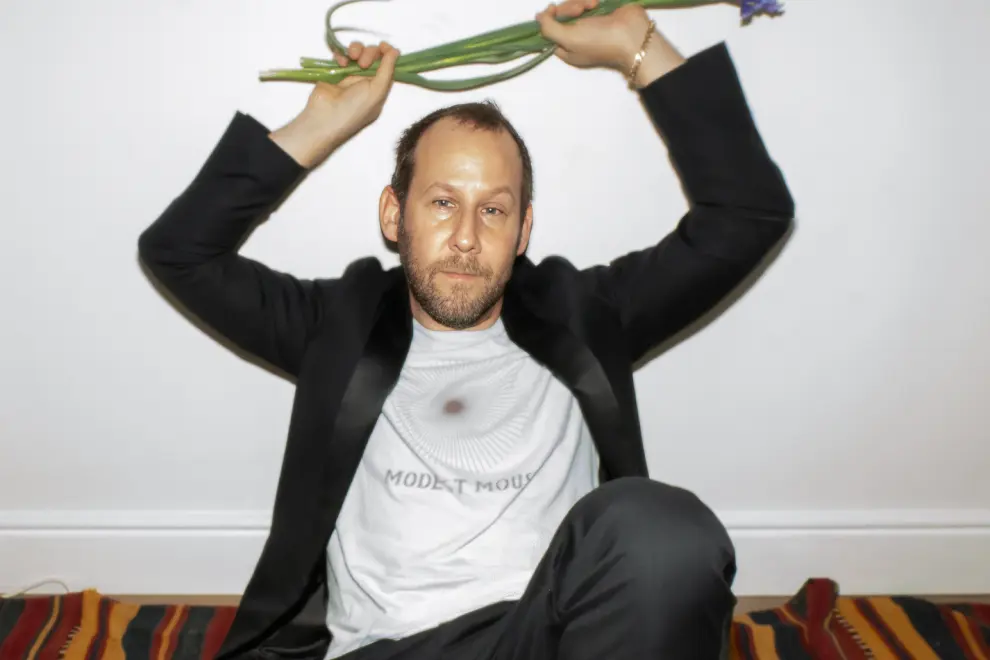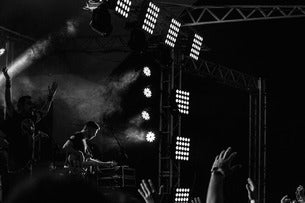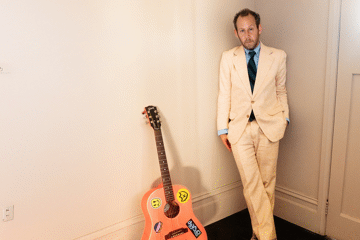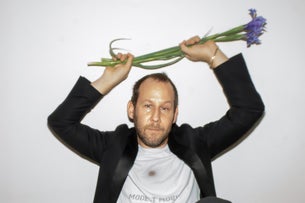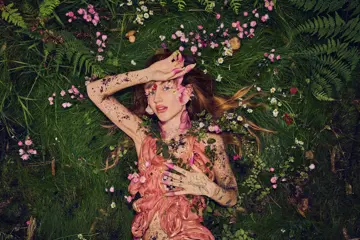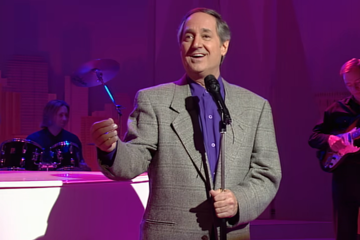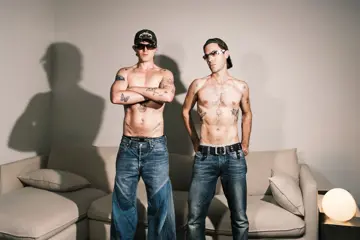 Ben Lee
Ben LeeEven though he’s only now in his mid-40s, for well over 30 of those years, beloved Aussie singer-songwriter Ben Lee has been in the public spotlight creating and sharing his take on the music that he loves, forever forging forward in a career that’s now 15 solo albums deep (not even counting his formative band The Noise Addicts nor any of the numerous collaborations and soundtracks that he’s contributed to over the journey).
Now, 20 years after the release of his venerated fifth album Awake Is The New Sleep (2005), he’s pausing the perpetual forward momentum to take a rare look backwards. That album reached #5 on the ARIA Albums Chart, went double-Platinum and spawned his most successful single Catch My Disease - among a host of enduring anthems - in the process consolidating Lee’s place amongst our country’s most respected and successful songsmiths.
It represents one highly successful moment in a career full of successful moments, and even Lee seems surprised that he’s stopping for the occasion to glance in the rearview mirror.
“It is bizarre,” he smiles. “I'm not someone prone to looking back, so as I was approaching it, it felt like, ‘Okay, this is the sort of thing that feels like a milestone’, but every cell in my body was like, ‘No nostalgia, no nostalgia, forward, forward, forward!’, because that's just how I think.
Don't miss a beat with our FREE daily newsletter
“But as I'm entering the process, I'm finding it kind of surprisingly… It's almost a little bit liberating or something. Like, if you have a box of keepsakes and you never look in them, you tend to over-mythologise - it becomes, ‘Oh man, I don't want to open that’.
“It’s the same as having a storage container after you move and you’re, like, 'I don't want to go there, I can't deal with the storage!’ And then you kind of realise you're making it a bigger deal, and you're adding this sort of energy to it by not looking at it for ages and then suddenly looking at it.
“Because it's emotional for artists, whatever is your biggest commercial album. There's a lot of feelings around that to do with achievements, to do with your desires, your disappointments - there's so many, it’s just very potent stuff. So, looking at it directly and starting to think about it, I'm almost finding that it's making me feel good. It's making me feel healthier or something.”
Awake Is The New Sleep was born during a tumultuous time for its creator. After achieving massive success with his third album, Breathing Tornadoes (1998), the follow-up Hey You. Yes, You. (2002) had not been as well-received, leading Lee to part ways with his label, Modular.
Compounding matters, the singer had also endured the ignominy of a high-profile relationship break-up under the scrutiny of the public gaze, but instead of wilting under pressure, these events only seemed to reinvigorate his creative sensibilities.
“It was kind of like open, like there was now nothing off limits,” Lee reflects. “There’s periods in your life where somehow, cosmically, you end up with this sort of permission to reinvent yourself. So I was going through a breakup and feeling really impassioned and open and energised and writing all these songs.
“And then I think a huge thing for me was that it was the album where I was officially finished with my teen angst, where suddenly I started thinking about making music in a different way. It wasn't just, ‘I've got to get it all out and vomit it out and get my feelings out’, now it was about, ‘Wow, I can entertain people and I can make people happy and I can give them an experience, hopefully one that is generous’.
“So that was like the beginning of this next chapter for me, and it was just a really fun, really fun time.”
It was quite the unique position Lee found himself in at this juncture, in his mid-20s and striving to pivot a career that he’d already been forging for well over a decade.
“Yeah, I mean, I don't want to be superstitious to a point that I create this pattern further, but I have noticed that these periods of invigoration often come after a failure or feeling washed up or something,” he tells. “You have these different career peaks, and then the phone's ringing a lot, and then it isn't. And sometimes those bad times can be really important, I'm a big believer in that.
“I like the phrase people use with songwriters, ‘the wilderness years’. You need wilderness years because they're like the time when you go on a vision quest and you rediscover your passion. So, having this really long arc already by that point, I'd already been through the initial rush of like being discovered and sort of embraced by like alternative music culture or whatever, and then that kind of dying down and then having my first hit with Breathing Tornadoes and then that kind of dying down.
“So there was definitely a feeling of, ‘Wow, maybe my commercial best is behind me,’ and yeah, that's wild to have that feeling at like 23, 24, 25. It's also so wrong, but you don't realise that because you look at other examples.
“That's the thing, if you look at other people's journeys too much, you see a lot of people who sort of chickened out from having another swing after things don't work. A lot of people give up after they have one album flop, and you can't really look to those people's careers as instructive, because you've got to look at the people that just keep swinging, and you go, ‘Oh, eventually it reconnects’.”
The new, more affirmative and uplifting vibe found on Awake Is The New Sleep - in comparison to the moodier imagery prevalent throughout Lee’s earlier work - has long been famously attributed to a trip to India where he sought guidance from Sakthi Narayani Amma.
While the spiritual leader’s early lessons proved extremely helpful, helping him realise the importance of using his platform for positivity, the singer explains how, like many such dalliances, that relationship gradually became less constructive over time.
“It was kind of interesting because the very beginning was sort of akin to a cult,” he offers. “Eventually, I went deeper and deeper into it, and it got murkier and murkier, and it actually dampened my creativity over the years as it progressed, as I think most group-think environments do.
“But most of these songs were written either right before that first trip to India, or right after, or during - so it was like falling in love. And even though a relationship ends up being dysfunctional, it was just bringing out the best in me at that time. I think questions that I'd always had about how to live a life meaningfully… it wasn't like I got answers to that, but suddenly, I felt it was okay to be in a state of existential inquiry.
“I felt that that part of my personality had been ignored. In indie rock in the 90s, there wasn't much room for real philosophical or spiritual inquiry, because everything was really deadened - everything was distant, there was like a sarcastic irony and everything - it’s the Pavement years and Beck and all of that.
"So personally, I think by things like going to India - and all those experiences like trying psychedelics and all that stuff - they sort of like gave me permission to just be like earnestly, authentically searching, and I think that opened up my songwriting too.”
Lee explains that even though his ‘90s indie rock heroes had always lived in the shadow of Nirvana - where commercial success was seen as the antithesis of integrity and therefore something to avoid, or at least not openly chase - he’d long harboured dreams of breaking through into the big leagues.
“I didn’t really grasp that until I worked with Ed Buller, who produced Breathing Tornadoes, and he came from the British pop music world where there was no shame around having hits,” he ponders. “Like those bands that he'd worked with - Suede, Pulp, Spiritualized, and he was in The Psychedelic Furs - they all wanted to be number one, and they wanted to be good. They wanted to have good hits.
“And interestingly, I think I always loved that idea. I mean, going back to loving The Lemonheads and Nirvana - and as much as I loved also Fugazi and Yo la Tengo and Beat Happening and more obscure stuff - I loved the idea of rock stardom or success that belonged to the good guys. I thought that was a really appealing idea, and I always wanted to be as successful as I could be. I love attention and all that kind of thing.
“So yeah, that put me a little bit at odds with some of the ethos of the sort of Sonic Youth world. But, I don't know, you don't get to be Sonic Youth without wanting a lot of attention too. They weren't like a Top 10 kind of band that teenage girls were chasing down the street, but they still played the game enough to make videos and do cool photos and try and seem aspirational in their own way. I think there was a lot of repressed ambition in the ‘90s.”
Tellingly, the B-side of Catch My Disease was a cover of the recent hit Float On by US indie icons Modest Mouse, another instance of a band consciously taking a more affirmative and positive approach to their craft.
“Absolutely!” Lee enthuses. “That song came out while we were making Awake Is The New Sleep, and we would go out to these clubs in Hollywood that Steve Aoki was always DJing at - these little clubs - and every night everyone would dance to Float On. It was that ‘the indie kids were dancing’ era suddenly.
“And I do think that influenced Catch My Disease particularly, and the idea of, ‘Oh my god, hits that are fun are so good!’ I think I was metabolising that concept.”
Catch My Disease’s feelgood vibe would in time help it become Lee’s most successful song - rising to #27 on the ARIA Singles Chart and #2 on triple j’s Hottest 100 of 2005 poll, as well as featuring prominently in an episode of US drama series Grey’s Anatomy (and scoring a place on that show’s soundtrack) - but the singer explains that he has aspirations of such traction for all of this compositions.
“I remember that Brad Wood, who produced Awake…, he saved Catch My Disease to last - he wanted to work on that last,” Lee recalls. “He said it was because it felt like an important song on the record and he wanted to really know what the album was and have our palette sort of together before we attacked it, like not to rush it.
“I think he had a better idea [of the song’s potential] than I did. I think, to me, it just seemed like a fun, silly sing-along kind of song. I mean, you know, I have the ego of a songwriter who, every time I write a song, believes that it has the capacity to touch the masses, because that's what I'm doing. And some of them do and some of them don’t, and some of them you feel, ‘Oh, they missed their opening’.
“There's all sorts of relationships we have to these songs, but I definitely always hoped that songs could be hits. Unless I do something really weird like, say, [album track] Light - being a 10-minute song with a saxophone solo - obviously that's not a single. But aside from that, I don't relate to this idea now that way people write songs where there's like the three singles and then album tracks.”
“I've always just thought you try to write every song on the album as a potential massive hit, and there'll be one or two that might actually sort of embody that concept and then go on to become singles. So I've always thought singles were just the best songs on a record, but you didn't go into recording knowing necessarily what the singles were going to be.”
One of the reasons that Lee is open to revisiting Awake Is The New Sleep for the anniversary is that over time he’a realised that the album wasn’t just a success in terms of shifting units, but that it also forged a deep and durable connection with his fanbase, who haven’t been shy in telling the singer how much it means to them.
“Yeah, that's wild,’ he marvels. “Even now it's coming up a lot, people are telling me [how much the album means to them], and I'm blown away. I'm blown away. The thing I come back to is that the album did change my life. It changed my life on a lot of levels.
“Having another hit after Breathing Tornadoes, that's the point that artists crave. [1998 single] Cigarettes Will Kill You was a really big song, and now it's sort of recently getting a little bit more rediscovered, but I think it got really eclipsed by how big Catch My Disease was. But your second hit really is kind of like make or break.
“I mean, I don't like the idea of one hit wonders as a concept because I think musicians should be so lucky to have one hit - most musicians never have any hits. So, if you have a hit, you may well be able to get your kid’s braces done - whatever it is that you have to do - having that one hit, if you're lucky, can provide that opportunity. So I don't look down on one hit, but still, we all want to prove things aren't a fluke, you know?
“So in a self-esteem way, having the album do well was really, really important to me. And the fact that I was able to reinvent myself and the sound, even though the message of the record - I guess the vibe of what I do as a songwriter - it’s like always kind of been the same. I write romantic, smart pop songs that are full of yearning and cheeky: that's what I do. Yet I was able to reinvent the aesthetic and deliver it in a new way that felt relevant. I felt proud of that.
“And then, as far as like the enduring nature of it, it's something that I think, like I said in the beginning, songwriters often wrestle with that because it's actually quite hard to admit that you may have touched something that may not be touchable again. That may be that moment, and the odds that I would have another moment as big as Catch My Disease; the odds are stacked against you. That is a very unlikely situation. That was a very big, very special song on an album of big, special songs.
“I actually think Oasis, funnily enough, even before the reunion, they've been really amazing about honouring their legacy. Even when they hated each other and were never gonna step in a room together at the same time, they never doubted the power of the work and what it meant.
“And I think I took a lot from watching artists like that. Like Paul McCartney has that too - not to put myself on that level, I'm just saying people that have experienced success - that I remember someone asking him on one of those docos, what would you change about The White Album if you could? And he said, ’It's The Beatles’ White Album! Why would I want to change anything?” And it’s true, you do have to feel immense gratitude for getting to be part of an experience of an album that really connected.
“And what it really meant, the specifics of this album, was that it was about opening up - it was about opening up to new possibilities, to wonder, to adventure. Everyone who this album means a lot to, it's connected to those feelings.”
To celebrate the national tour honouring the 20th anniversary of Awake Is The New Sleep, which will make its way around the country in September and October, Lee has recorded a new and updated version of Catch My Disease with his mates from US rockers Phantom Planet.
While many artists express serious reservations about retackling their most beloved songs, Lee admits to feeling no such qualms.
“Not really,” he grins. “I mean, only in the sense that when I was doing the vocals, I realised I had to sing it in a way that fit the track, not the way I sing it when I'm just playing it by myself. But I sort of like the irreverence. Throughout my whole career, the best moments have actually been really irreverent, like not taking myself too seriously or the job too seriously.
“And I liked the idea of having another pass. What I see with a lot of the nostalgia and the narrative around anniversary shows is this over-seriousness about it, as if we're talking about an anniversary of when women got the vote or something. It's a collection of pop songs that were kind of thrown in quite a casual way. And I thought some of the way I want to approach the anniversary is with a similar sense of casualness - like, ‘Yeah, let's do another version of it. Cool. You want to do that?’
“Charli XCX is doing a lot of interesting things around that, around re-examining the cycle of a song, the life cycle: about bringing something back from a couple of albums ago, and when is the right time to let things go, and do you ever let them go now that we're in digital worlds where everything's perpetually new and old at the same time? So yeah, I just wanted to have fun with it, basically.”
He also professes to not being put off by the prospect of delivering Awake Is The New Sleep in full on a nightly basis for the duration of the tour.
“I've never done this and I'll be honest with you - though I know The Lemonheads did it the other night - I haven't even seen a bunch of these shows,” he admits. “They're just not something I'm organically drawn to going to see, though I’m getting curious now because I'm going to do one. But I do kind of like the idea, and this is probably from an era that will never be repeated because albums now aren't what they were then. You don't listen to the whole thing as much, or many people don't.
“But I know there’s those certain albums that when one song ends, I know exactly what's going to come in in the next 10 seconds, and there's something almost visceral, it's like muscle memory when that happens. So I don't know, I'm kind of excited about that: that you bring that and the audience brings that together, and you know what the flow of the process is going to be.
“But I'm also interested in breaking it up and telling some stories that I haven't told before and things specifically about the writing of the songs or the fallout of these songs or different things and sort of stringing it together in a bit of a narrative sense too.”
Lee explains that while Awake Is The New Sleep has racked up plenty of accolades - in the album’s direct aftermath, he won four ARIAs from six nominations, with the album later listed in the prestigious 2010 tome ‘The 100 Best Australian Albums’ - none of that is as important to him as how the songs connected with the Australian public.
“It's funny, I think as you get older, you get very pragmatic,” he muses. “I sometimes look at, say, actors when they win an Oscar, and I can kind of see in their mind, they're going, ‘All right, I'm going to get like three more jobs out of this. I'm going to continue to be gainfully employed’. And I think some of those markers are really about that - they’re just about relative cultural capital that you have that can help you get your projects done and help you keep going. I don't know, I can't say with ARIAs and all that… I don't know, it's better winning them than not.
“It's so funny, because the other night I got up with Hot Dub Time Machine when he played Hordern Pavilion and I sang Cigarettes Will Kill You - and then I did a cover of The Living End’s Prisoner of Society - but I was like, ‘Wow!’ Look, he may not have included that song had I not been getting up to play it, but it still felt believable - it was believable that I've got a song that can be considered part of the story of popular music.
“And I was thinking that when I was up there, I was, like, ‘Wow, it's so funny that I really am like an indie rocker who gets to pretend to be a pop star every now and then’. And I'm not as good a pop star as a lot of other people - like Troye Sivan is like an infinitely better pop star than I am - but I was never trying to be the best pop star, I was just trying to be an interesting one. And I think I still am.
“That’s something I think people miss about me, how much I love culture, and how much being part of it - and making it interesting and adding value - is important to me. I always thought, you can't be boring - that is a complete insult to the community of people who are passionate about music. Be interesting, say something interesting. Maybe it's wrong, but say it, you know?
“And I think that I feel really glad that I continue to get to have a platform to say interesting things and do interesting things. I've had successes and failures - I've put out songs where I've been like, Oh, that was a clunker, that didn't really work” - but I keep trying. And I think in some ways I still have the platform I have because I keep trying, so it's really nice.”
Ben Lee will celebrate the 20th anniversary of Awake Is The New Sleep on a massive national tour; tickets are now available on the Frontier Touring website.
Presented by Frontier Touring
BEN LEE
AWAKE IS THE NEW SLEEP 20TH ANNIVERSARY TOUR
SEPTEMBER & OCTOBER 2025
Thursday 25 September - UC Refectory | Canberra, ACT | Lic. All Ages
Friday 26 September - King Street Bandroom | Newcastle, NSW | Lic. All Ages
Saturday 27 September - Liberty Hall | Sydney, NSW | 18+
Thursday 2 October - The Beach Hotel | Byron Bay, NSW | 18+
Friday 3 October - The Princess Theatre | Brisbane, QLD | 18+
Saturday 4 October - Miami Marketta | Gold Coast, QLD | 12+
Thursday 9 October - Theatre Royal | Castlemaine, VIC | 18+
Friday 10 October - Torquay Hotel | Torquay, VIC | 18+
Saturday 11 October - Northcote Theatre | Melbourne, VIC | 18+
Friday 17 October - The Gov | Adelaide, SA | 18+
Saturday 18 October - Fremantle Arts Centre – Front Garden | Fremantle, WA | 18+

